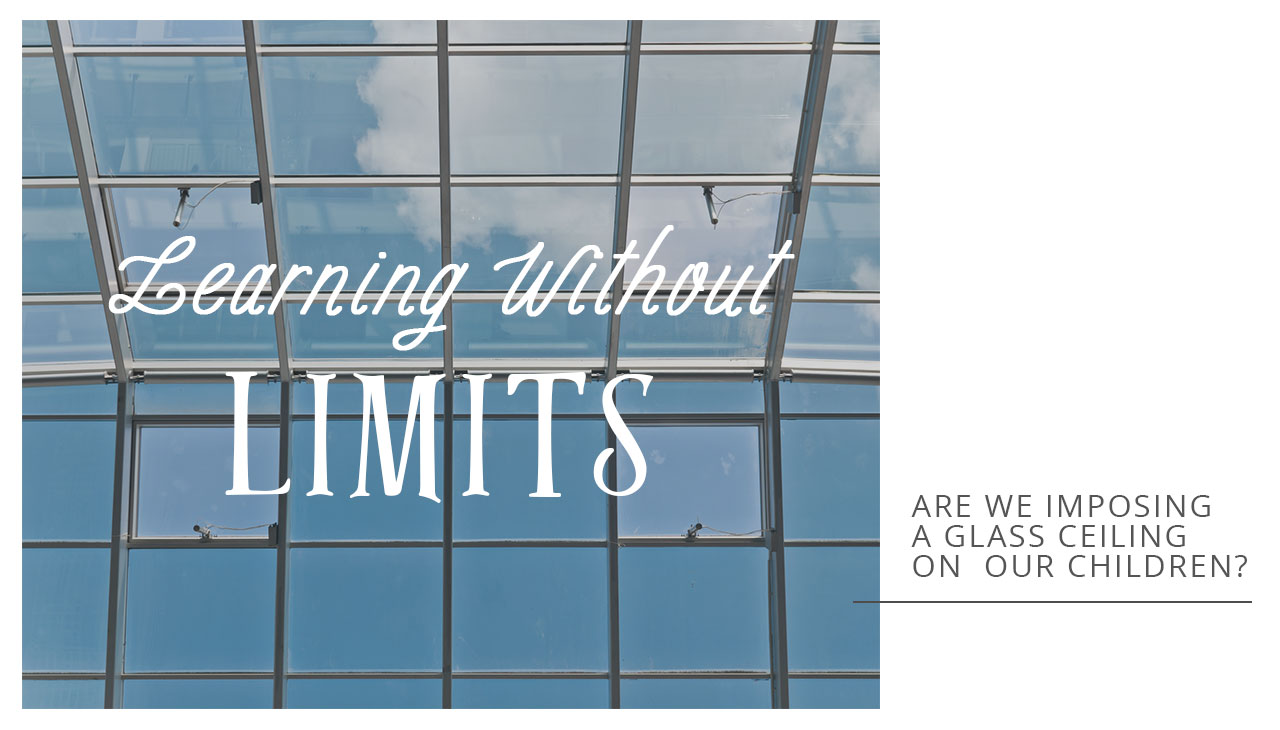Are We Imposing a Glass Ceiling on Our Children?

As a society, we tend to underestimate the potential of children. As educators, we are trained to adhere to developmental models, and as parents, we feel the pressure to check off a predefined list of specific milestones at each age and stage of development.
Although these behaviors are natural for parents and educators who are striving to do everything they can for their children, they may at times (often unwittingly) impose limitations on our expectations. This narrowly defined focus may cause us to miss out on other signs of growth, insight (and possibly brilliance) from our children. As our children get older, the checklist becomes even more standardized when they move into a one-size-fits-all educational paradigm.
Although understanding the milestones of child-development is important, perhaps we should pose some questions…
- Do they prevent us from noticing and nurturing other traits, characteristics, or strengths that are equally important?
- Do they on some level, impose a glass ceiling by predetermining what children are and are not capable of?
- Do they on a subtle level, cause us to dumb down our language, responses, and expectations of our children based on this “common knowledge?”
- Do they lead us to believe that children are only considered capable if they process and demonstrate their understanding in predetermined ways?
Observant parents and educators realize that there is much more to children than meets the eye. Children are inherently driven to actively investigate and make a positive impact on the world around them. When presented with stimulating and engaging experiences, children intuitively take full advantage of the opportunities to learn. It’s up to us as parents and teachers to encourage children to tap into their potential by nurturing these internal processes.
Maria Montessori once said:
“The child is endowed with unknown powers, which can guide us to a radiant future. If what we really want is a new world, then education must take as its aim the development of these hidden possibilities.”
― Maria Montessori
Loris Malaguzzi, founder of the schools in Reggio Emilia, Italy, agrees about the untapped potential of children:
“All people, and I mean scholars, researchers, and teachers, who, in any place have set themselves to study children seriously, have ended up by discovering not so much the limits and weaknesses of children, but rather their surprising and extraordinary strengths and capabilities, linked with an inexhaustible need for expression and realization.”
― Loris Malaguzzi
By realizing that children possess hidden potential that may exceed our narrowly defined expectations, we can make a more concerted effort to help them unleash it.
However, this DOES NOT mean pressuring children to read by age five. Shifting the content of a third-grade curriculum to a fourth-grade level and claiming to have raised “standards” is not the solution.
Too often, current school curricula do not leave much room for exploration, investigation, or at times, even questions. Combine that with mandated, high-stress, high-stakes tests, that are written to confuse and trick children, and teachers who are being evaluated based on those scores—and you have a recipe for disaster. Not only are we placing a glass ceiling on our children, we are tying the hands of our most gifted and talented teachers.
Have you noticed an increase in your child’s level of anxiety related to performing in school? Does your young child already feel as if they can’t keep up academically? Is this how we intend to inspire the next generation of children to live into their potential? Given the recent cognitive research that shows how stress inhibits meaningful learning, I hardly think so.
What if Maria Montessori was right?
What if children are capable both intellectually and emotionally of far more than we as a society ever allow them to reach or express?
What does that mean for us as parents and educators? As a society, are we placing our resources, talent, time, and energy in the right places?
The good news is that as parents and teachers, we can tune in and do little things that can make a big difference for the children in our lives…
Connect
Find little moments to slow down and be fully present with your child. Let go of expectations, set plans, or preconceived ideas of how this time will go. Be present with your child and follow their lead. Listen intently and make suggestions based on an interest they express. Pick-up on one of their ideas and run with it. This shows the children in your life that their questions deserve answers, their thoughts are interesting, and their ideas are worthy of coming to fruition.
Free Time
With so many facts and skills being squeezed into the school day and more pressure to cover greater amounts of data, one of the best gifts that grown-ups can give their children is time to discover and pursue their personal passions. For it’s the endeavor that is chosen approximately 10 minutes after the infamous “I’m Bored…” declaration that shows you where your child’s true interests lie.
Tune Into Your Expectations
If given the support, children will rise to our expectations. It is up to us to constantly check in with ourselves about what we are really expecting. If we are tired of seeing a certain behavior in our children, we need to make sure that we are not actually looking for or setting them up for that behavior.
On the other hand, when we really believe that our children are capable of doing something, more often than not, they do. Hold the picture of them being respectful, treating their siblings kindly, sharing their things, or whatever your goals are for them, clearly in your mind. Then, speak to them, treat them, and respond to them as if they are on their way to achieving that goal. When you really believe that your children are capable, then the inevitably slip-ups, simply become teachable moments.
There is nothing more exciting than when our children surprise us with their brilliance, insight, and creativity. Let’s give them every opportunity for them to show us their best selves…

